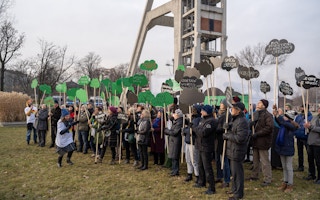The talks were long and fraught, but at the end of the COP24 climate summit in Poland last month, nations finally agreed on a plan to put the fragile 2015 Paris Agreement into practice.
However, while a multilateral effort to try and combat the impending reality of global warming is critical, we also need to confront another dangerous reality: deliberate climate denialism.
This is the overt and sometimes covert activities of those seeking to undermine scientific consensus about the causes and consequences of global warming.
While proponents of climate denialism consistently negate the need to take action in the face of climate science, they have been very flexible with regard to the arguments they have put forward to argue their case. Historically, climate denialism has gone through five phases.
In phase one, the argument was plain and simple: ‘the planet isn’t warming up’.
“
Science has consistently shown that the costs of human-induced climate change would massively outweigh any benefits global warming might have.
As this proposition could not be maintained for long, stage two emphasised natural climate variability: ‘the planet may be warming up, but hasn’t there always been climate change?’ Human activities were supposedly not to blame and so there was no need to act.
While this second stage denialism still has some supporters today – among them the current US president – climate science has made very clear that we can only explain the patterns of temperature rise after 1850 if we take carbon emissions resulting from industrialisation into account.
Denialists then shifted to a third argument: Conceding that global warming may be happening, and that it might also be due to our own carbon dioxide emissions, but if it allowed us to grow pineapples in Russia, for instance, it had not only costs, but also benefits.
Once more, however, the science has consistently shown that the costs of human-induced climate change would massively outweigh any benefits global warming might have.
In sum, the substance of climate science was increasingly hard to debate. As a result, phase four denialists have shifted the stage and targeted the integrity of the scientific community itself.
They often argue that they find a science in which there is a “consensus” somewhat suspicious, as shouldn’t disagreement be essential for any scientific community?
However, this argument seems to confuse climate science with the Intergovernmental Panel on Climate Change (IPCC). At scientific conferences, climate researchers engage in the same arguments and fights that characterise interactions in any other scientific community.
The IPCC, however, is the exact opposite of a scientific conference. It is an international body tasked with summarizing the existing consensus – or lack thereof – in the field of climate research. Its role, therefore, is independent of the disputes that are central to any scientific endeavor.
This leaves us with a fifth phase. The arguments presented here are best described as ‘skeptical’, not ‘denialist’.
Those who subscribe to it accept that climate change is real, humans-caused and that it its bad. Yet, they hold, many other things are bad, as well.
So why should global warming come first? Political attention is a scarce resource, and global warming attracts a lot of that attention while other global challenges like malaria or the loss of biological diversity fall by the wayside.
It is true that science cannot replace politics, nor should accepting a responsibility to respond to global warming mean we can forget about our responsibilities elsewhere.
But climate change is different in that, based on everything we know so far, it will act as a catalyst for many, if not most, other threats humanity confronts, including malaria and threats to biological diversity.
If this argument is correct, there are good reasons to tackle climate change first. Doing so would not only honor the principled idea that ‘if we are to err, then let us err on the side of caution’ – an idea the US delegation once espoused in international talks aimed at protecting the ozone layer.
It would also prevent the professional deniers from eventually invoking a sixth reason for inaction – namely that, while global warming is both real and bad, it is now too late to do much about it.
Klaus Dingwerth is a professor for political science at the University of St. Gallen, Switzerland, as well as a non-residential fellow with the Global Public Policy Institute in Berlin, Germany.
This story was published with permission from Thomson Reuters Foundation, the charitable arm of Thomson Reuters, that covers humanitarian news, climate change, resilience, women’s rights, trafficking and property rights. Visit http://news.trust.org/climate.











